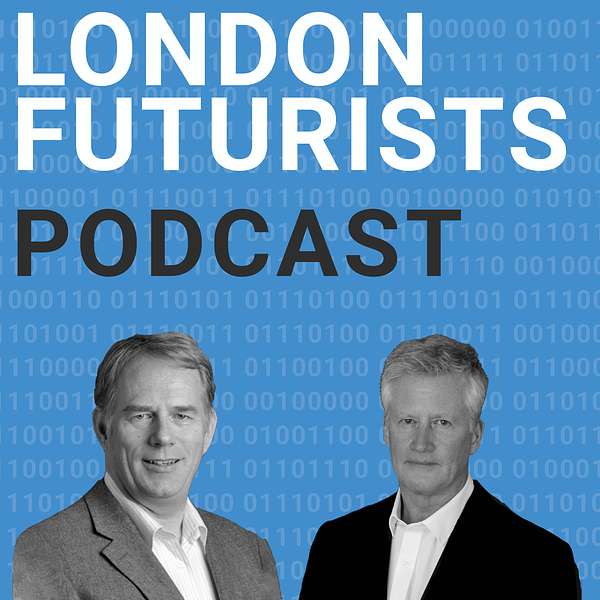
London Futurists
Anticipating and managing exponential impact - hosts David Wood and Calum Chace
Calum Chace is a sought-after keynote speaker and best-selling writer on artificial intelligence. He focuses on the medium- and long-term impact of AI on all of us, our societies and our economies. He advises companies and governments on AI policy.
His non-fiction books on AI are Surviving AI, about superintelligence, and The Economic Singularity, about the future of jobs. Both are now in their third editions.
He also wrote Pandora's Brain and Pandora’s Oracle, a pair of techno-thrillers about the first superintelligence. He is a regular contributor to magazines, newspapers, and radio.
In the last decade, Calum has given over 150 talks in 20 countries on six continents. Videos of his talks, and lots of other materials are available at https://calumchace.com/.
He is co-founder of a think tank focused on the future of jobs, called the Economic Singularity Foundation. The Foundation has published Stories from 2045, a collection of short stories written by its members.
Before becoming a full-time writer and speaker, Calum had a 30-year career in journalism and in business, as a marketer, a strategy consultant and a CEO. He studied philosophy, politics, and economics at Oxford University, which confirmed his suspicion that science fiction is actually philosophy in fancy dress.
David Wood is Chair of London Futurists, and is the author or lead editor of twelve books about the future, including The Singularity Principles, Vital Foresight, The Abolition of Aging, Smartphones and Beyond, and Sustainable Superabundance.
He is also principal of the independent futurist consultancy and publisher Delta Wisdom, executive director of the Longevity Escape Velocity (LEV) Foundation, Foresight Advisor at SingularityNET, and a board director at the IEET (Institute for Ethics and Emerging Technologies). He regularly gives keynote talks around the world on how to prepare for radical disruption. See https://deltawisdom.com/.
As a pioneer of the mobile computing and smartphone industry, he co-founded Symbian in 1998. By 2012, software written by his teams had been included as the operating system on 500 million smartphones.
From 2010 to 2013, he was Technology Planning Lead (CTO) of Accenture Mobility, where he also co-led Accenture’s Mobility Health business initiative.
Has an MA in Mathematics from Cambridge, where he also undertook doctoral research in the Philosophy of Science, and a DSc from the University of Westminster.
London Futurists
Enabling Extended Reality, with Steve Dann
Use Left/Right to seek, Home/End to jump to start or end. Hold shift to jump forward or backward.
An area of technology that has long been anticipated is Extended Reality (XR), which includes Virtual Reality (VR), Augmented Reality (AR), and Mixed Reality (MR). For many decades, researchers have developed various experimental headsets, glasses, gloves, and even immersive suits, to give wearers of these devices the impression of existing within a reality that is broader than what our senses usually perceive. More recently, a number of actual devices have come to the market, with, let's say it, mixed reactions. Some enthusiasts predict rapid improvements in the years ahead, whereas other reviewers focus on disappointing aspects of device performance and user experience.
Our guest in this episode of London Futurists Podcast is someone widely respected as a wise guide in this rather turbulent area. He is Steve Dann, who among other roles is the lead organiser of the highly popular Augmenting Reality meetup in London.
Topics discussed in this episode include:
*) Steve's background in film and television special effects
*) The different forms of Extended Reality
*) Changes in public understanding of virtual and augmented reality
*) What can be learned from past disappointments in this field
*) Prospects for forthcoming tipping points in market adoption
*) Comparisons with the market adoption of smartwatches and of smartphones
*) Forecasting incremental improvements in key XR technologies
*) Why "VR social media" won't be a sufficient reason for mass adoption of VR
*) The need for compelling content
*) The particular significance of enterprise use cases
*) The potential uses of XR in training, especially for medical professionals
*) Different AR and VR use cases in medical training - and different adoption timelines
*) Why an alleged drawback of VR may prove to be a decisive advantage for it
*) The likely forthcoming battle over words such as "metaverse"
*) Why our future online experiences will increasingly be 3D
*) Prospects for open standards between different metaverses
*) Reasons for companies to avoid rushing to purchase real estate in metaverses
*) Movies that portray XR, and the psychological perception of "what is real"
*) Examples of powerful real-world consequences of VR experiences.
Music: Spike Protein, by Koi Discovery, available under CC0 1.0 Public Domain Declaration
Selected follow-up reading:
https://www.meetup.com/augmenting-reality/
https://www.medicalrealities.com/about
Elevate how you lead with insight from today’s most influential executives.
Listen on: Apple Podcasts Spotify

